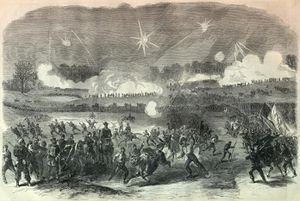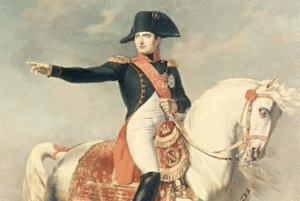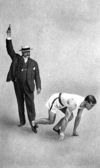Retreat
A retreat is often mistaken as a withdrawal of military forces upon defeat, or even more so ridiculous, an operation intended to lull the enemy into a false sense of security. It is in fact, the athletic predecessor to running on the Olympic scale. When an army faces its enemy, it may decide to approach their forces and just when they open fire upon their advance, they immediately turn around and run back to the nearest base without getting wounded or killed.
History[edit | edit source]
In modern times, the world is brought together by sporting events, such as the football World Cup and the Olympics. As well as showing off the competitive skills of each nation, it draws a spirit of goodwill between all of the countries involved. In the 18th and 19th century, there were no sporting events to keep the world together in peace and harmony. Instead, they had war. Each nation pitted against one another in the period of the Age of Reason. Empires, revolutions, piracy, civil wars, diplomacy, and best of all: retreating.
When Napoleon Bonaparte was crowned Emperor of France in 1804, he rebuilt France, strengthening her armies, expanding the empire, reorganised society, glorified the countryside, crowned himself emperor for life and uh… kicked out the nobles who said they were leaders for life, I guess. But above all, he introduced a new sport that would become the national sport of France: retreating.
Upon establishing the Grande Armeé, Napoleon had the problem of dealing with the French soldier’s fear of attacking anyone who isn’t French. This issue was discovered in 1803 when he was forced to call off the invasion of England; just before his armies boarded the ships, they were brutally defeated by a gust of wind blowing the navy back to Boulogne. He decided that the best way to deal with this was to beef up the French forces by putting them through athletic programmes to increase their physical strength. Unfortunately, this had an adverse effect, as the fitness lessons taught the French troops to run faster and gave them a better chance of high tailing it out of a war zone alive. As a result, retreating from battle was born.
Famous retreats[edit | edit source]
1812 - French invasion of Russia[edit | edit source]
In 1812, the Napoleonic wars reached a high when the Grande Armeé punched above their weight and took on Russia. Upon stepping into the Russian border, the French troops immediately picked a fight with the snow. They were defeated, and started the long retreat back home.
1940 - Nazi invasion of France[edit | edit source]
France did themselves in again and pulled off yet another spectacular retreat, this time in WWII and on their own turf. The Nazi troops had taken over Holland and Belgium, a third invasion was imminently planned, this time on France. Realising this, the French government immediately drew up various excuses for not defending their land. Finally, as the German forces drew closer to their capital, the French claimed that they didn't want to ruin their beautiful city of Paris. They began to retreat and retreat and retreat, until there was no more France left for the Germans to conquer. They decided to retreat in on themselves and dress up as chickens to represent their attitude towards the war. From this idea of disguising themselves from the enemy, the French Resistance was born.
Legacy and modern retreats[edit | edit source]
Thanks to retreating, the idea of running as a sport has made it to the world stage. In Napoleon’s time, the farthest a musket ball could be fired was 100 metres, giving birth to the modern Olympic event: the 100 metres gold. The idea of the starter using a pistol, also derives from retreating from the sound of the enemy guns. When the British invaded Jamaica in the 1600s, the natives fled from the European guns. Today, the fastest man alive is Usain Bolt, a Jamaican. However, while it has thrived as a sport, the actual military origin of withdrawal has felled in the years. In August 2008, journalists sent to the Georgian border to interview anti-Russian separatists had to go home empty-handed, as all of their interviewees had run off.


